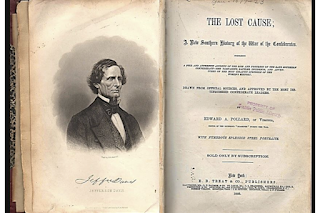A few days ago, I saw a post on Twitter from CatGirl Kulak defending "Lost Cause" historiography. In case that term isn't immediately transparent to you, the "Lost Cause" is an interpretation of the American War Between the States (1861-1865, also called the Civil War, or by other names) which argues that the South was justified in seceding and that the war was not primarily about slavery. Lost Cause historians often argue that the South was driven to secede in order to protect its "way of life," and in particular that the southern states were ticklish on the question of "states' rights"—rights which were already becoming so infringed by a tyrannical and centralizing government in Washington, D.C. that separation was the only way to preserve them.
CatGirl Kulak's argument is that the historians who developed the Lost Cause interpretation were the ones who had direct access to surviving participants of the war, and so could question them. She argues further that the current generation of historians (who reject the Lost Cause interpretation pretty universally) are all Marxists, so what do they know? It's the kind of argument that sounds good until you think about it for a minute. Yes, the Lost Cause historians were closer to the action than we are today; they were also, to a man, Southern. And surely it is only natural that defeated Southerners—especially those who lived so close to the war that they still felt the shame of defeat—should try to put the best possible face on the choice to secede. As for protecting the Southern "way of life," already before the war it was well understood on both sides of the Mason-Dixon line that the critical, fundamental difference between the Northern and Southern ways of life lay in the South's "peculiar institution"—namely, slavery.
But the main point I want to make has to do with the topic of "states' rights," and it is a point far more general than the specific argument over Civil War historiography. It is simply this: Nobody in real life cares tuppence about the details of their legal rights until they actually want to do something!
My argument is simple: arguing about rights is abstract and boring, as long as it is being done in a vacuum. I can spin this theory, you can spin that theory, and at the end of the day who cares? But as soon as I want to do this or that thing in particular, … well if you try to stop me then I'm going to scream bloody murder that you are infringing my rights! (See also this post over on the Patio.) Then all of a sudden the argument about rights becomes intense and passionate, because the rights themselves are a smokescreen. The real issue is whether I get to do what I want. And you can bet that matters to me!
And of course it works the same way in mirror image for you.
So to say that South Carolina, Mississippi, Florida, and the rest were animated by a concern for "states' rights" is at best an evasive half-truth. The inevitable follow-up question has to be, "the state's rights to do what?" Since the Confederate Constitution was copied more or less directly from the United States Constitution, with only a few specific edits, it is hard to claim that Southerners wanted a settlement radically different from what they already had—except in one specific area. The most far-reaching of those "few specific edits" were the ones that permanently protected slavery.
It works exactly the same way in other arguments. Longtime readers will remember fourteen years ago, when Wife and I and the two boys went to visit my parents for a relaxing weekend and she unaccountably packed her handgun in with her makeup and underwear. For some time before that she had been behaving erratically, so when I found the handgun I lifted it and hid it away. From then until we finally separated (and even afterwards, come to that) Wife kept demanding that I return her gun to her.
I always asked, "Why? Whom are you planning to shoot?"
She invariably replied, "Nobody. But it's my gun, and I have a right to it."
(See for example this post and this one.)
And there we are. Since nobody cares about rights until they want to do something, I know she was lying. (It is possible she was not aware that she was lying, because sometimes Wife didn't understand her own motivations terribly well.) And if there is anyone on the planet that Wife wants to shoot, I rather fear it's me.
She hasn't asked for it in a long time, so I hope that's a good thing. (Either that, or she has just gone out and bought herself another.)





No comments:
Post a Comment